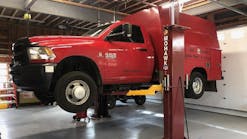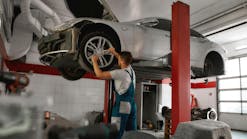Worried about the high cost of modifying diesel engines to comply with a state regulation intended to reduce emissions, some California truckers say a recent year-long extension isn't enough.
Approved by the California Air Resources Board in 2008, the regulation requires most heavier trucks to be retrofitted by Jan. 1 with diesel particulate filters, and nearly all trucks and buses must have 2010 model year engines or equivalent by 2023.
State environmental officials hope required upgrades will curb large amounts of smog-forming oxides of nitrogen (also known as NOx) and toxic soot emitted by diesel trucks and buses.
However, CARB announced last month that a majority of truckers who operate exclusively in San Bernardino County will not have to comply with the deadline, which affects trucks more than 26,000 pounds. Their deadline has been extended, for now, to Jan. 1, 2015, with a review of the deadline expected during an April board meeting.
"We've been approached by stakeholders (with concerns) throughout this year," Beth White, the manager of the CARB regulation, said Thursday. "That's one of the reasons we went to the (CARB) Board in October."
As a result of that meeting, CARB proposed an exemption that will include a large portion of the county, excluding a small southwestern patch bordered by the counties of Los Angeles, Orange and Riverside.
Truckers must file for a "NOx Exempt" extension with CARB by Jan. 31 to be permitted to hold off on buying a filter, but they will then be prohibited from working outside the exempt area -- meaning no trips to nearby cities such as Riverside or Palmdale.
At least in the short term, it's good news for Apple Valley resident Michael Velez, a self-employed truck driver with Victorville's Sully-Miller Contracting Co.
Velez, 51, said until the recent extension, he was preparing to lose his job at month's end. With the cost of filters in the $15,000 range, it was a required upgrade he said he and many other owner-operators could not afford.
"For a while there," he said, "I thought I was going to be out of business at the end of the year. I was like, 'What am I going to do?' We're all happy now because we'll get to survive."
Velez said business in recent months has significantly picked up as contractors push to get work done amid the uncertainty of looming regulatory changes.
"I haven't worked this much in four years," he said.
CARB spokeswoman Karen Caesar says that in 1998, a state scientific review panel identified diesel soot as a toxic air contaminate with an established link to cancer.
Since then, filters have been required on cargo-handling equipment, ships, public fleets, transit buses and solid waste vehicles.
"It would be easy to think we're picking on truckers," Caesar said, "which isn't the case."
She called privately-owned trucks "the last piece of the puzzle."
The expectation is the regulation will reduce particulate matter emissions by seven tons per day in 2014 and three tons per day by 2023, according to CARB. The agency also estimates that approximately 3,500 premature deaths statewide will be avoided.
However, Andy Smith, vice president of Hesperia-based Smith Trucking Co., says the regulation is not mindful of the current status of the industry.
According to Smith, some of the 50 to 60 owner-operators he works with would rather retire than put a hefty amount of money into an industry that hasn't made them much lately in return.
Since 2007, "it's been feast or famine -- and mostly famine," Smith said. "It's almost a poverty-level job and these filters can go anywhere from $15,000 to $20,000. Then the state is demanding you go out and put a $20,000 filter on a $6,000 truck."
To assist with costs, CARB does offer credits and incentives, according to a CARB fact sheet.
For example, fleet owners can delay compliance on some vehicles if they've retrofitted others with filters or replaced some vehicles with newer models. There are also a number of funding programs that provide grants, loans or vouchers.
However, Smith said financial assistance is limited, leaving many to use credit or dip into their savings to comply.
In November, Alliance for California Business filed a lawsuit against CARB and sought to delay the Jan. 1 deadline over what it said were faulty filters.
"The (diesel particulate filter), in its various iterations and designs, has caused innumerable problems for ACB," according to an ACB news release.
Filter manufacturer Cleaire shuttered in January amid recalls; its metal substrate filter had previously been linked to a 3,500-acre Washington fire in 2011.
White said Thursday that CARB officials had immediately contacted Cleaire "to recall those devices and create a reverified process" once the cause of the fire was known. She added that truckers must use filters that are CARB verified -- not to be confused with CARB certified.
White and Caesar said such problems were rare and needed to be put in perspective when compared with the many filters that have been free of problems.
An agenda for the board's April meeting is expected to be released in late February or early March, possibly shedding light on how regulation deadlines may be affected in the future.
"We're obligated to clean the air," White added. "We don't make these decisions arbitrarily."
According to CARB, the regulation affects approximately 170,000 businesses and nearly all industry sectors in the state, and almost a million vehicles that operate yearly on state roads.
Non-compliance can result in penalties and possible Department of Motor Vehicles registration holds, according to a November regulatory advisory by CARB.
Smith maintained that the regulation is "unrealistic" and he would prefer truckers to be granted a grandfather clause.
"This is my lifeblood," he said, "and this is affecting truly good people, people who want a piece of the American dream. Now, you can't do it unless you want to spend a lot of money."
For more information on the regulation and to view a map of "NOx Exempt" areas, visit http://arb.ca.gov.

